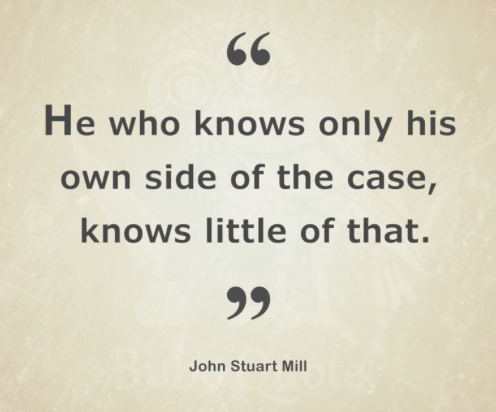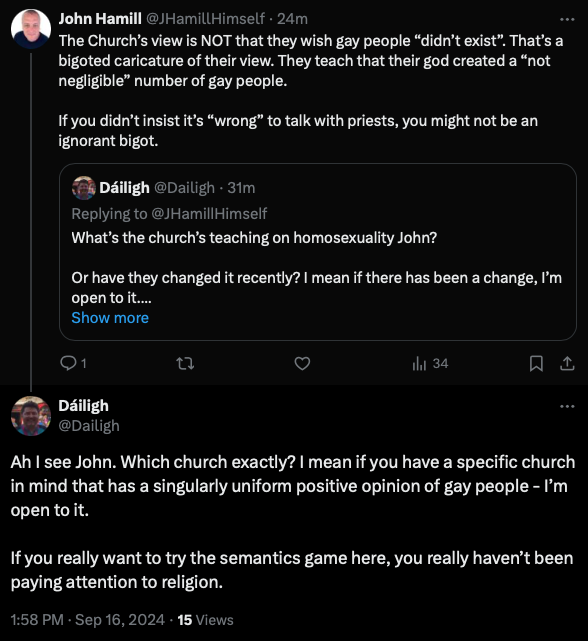Yesterday I published an article that argued against the condemnation of people based on who they had talked to, rather than the content of anything they had said or done. The specific case in point related to whether it should be acceptable to merely speak with a Catholic priest about marriage equality.

I provided some reasons why such idealogical purity tests that judge it “wrong” to speak with others who have alternative views, might be counterproductive at best. I didn’t imagine that this would be a contentious position. These are not new arguments, but rather the well-rehearsed liberal positions that for centuries have favoured free-thought and the open exchange of ideas, over the condemnation of heretics.

To my surprise, I have received some push back. It seems that the desire to apply idealogical purity tests, which insist that it is “wrong” to even speak with those who have alternative views, is not merely a reactionary reflex that inadvertently goes too far. Rather, this is a carefully considered position and a sincerely held view of some far-left extremists. It appears that those coming from this perspective, can genuinely not appreciate what the benefits might be of discussing a topic with someone who has an opposing opinion.

To abbreviate, since almost everyone will already intuitively understand these issues, the benefits of discussing such topics with those who have alternative views might include:
- Your view about what your opponent believes could be wrong, and so you could gain a more accurate understanding of their position.
- By exposing your own position to the best arguments against it, you can gain a better appreciation of the issues.
- You might learn about some nuance in the alternative position that you were unaware of, which could give you a new perspective on related issues.
- You might be able to convince your opponent of an error in their position, which will cause them to adopt your view.
A number of alternative approaches have now been described to me, which argue against the points enumerated above. These alternative positions constitute a defence of idealogical purity tests that condemn people for merely talking with a priest about an issue like marriage equality.
The first such argument was that during a referendum campaign seeking to introduce marriage equality to the Irish constitution, we “didn’t need Catholic priests” to adopt the position we were advocating. This seems to rather misunderstand the nature of a referendum campaign. The idea is to win as many votes as possible, and not to identify as many enemies as possible.

As my original article described, some priests were indeed convinced not only to vote for marriage equality, but to successfully campaign for it from the pulpit. This is what effective advocacy looks like. Anyone who is genuinely committed to marriage equality should welcome additional supporters for their position, rather than lament the loss of an enemy to attack.
The other problem with the thread illustrated above, is that it profoundly misunderstands the position of the Catholic Church on this topic. For someone who was skeptical that there could be any more enlightenment he could gain about the views of Catholic priests, he in fact barely knew anything at all about those actual positions. It is simply not true to state that Catholic priests would prefer that gay people “didn’t exist”.
I very strongly disagree with the Catholic position on homosexuality. I have stated forcefully in direct conversations with Catholic priests that Catechism 2358 is abhorrent, and extremely harmful. However within this Catechism, the Church teaches Catholics that their god has created a “not negligible” number of gay people, who it insists must be treated with “respect, compassion and sensitivity”. I believe that other parts of this Catechism are appalling, but it is simply not correct to say that the Church would prefer that gay people “didn’t exist”. To falsely attribute that position to total strangers merely because they are Catholic priests, and then to seek the ostracisation of Catholic priests on this basis, is ignorant bigotry.
It is not surprising that someone who refuses in principle to even talk with a Catholic priest, doesn’t know much about what the Catholic Church actually teaches. It is rather surprising though that someone who would wear their ignorance on this topic as a badge of honour, would at the same time seek to lecture others that they “haven’t been paying attention to religion”.

The extremist perspective illustrated above is not only sanguine about being entirely wrong on consequential issues, but is also opposed to the process of gaining a more accurate understanding. Considering it “wrong” to learn more about opposing views, is synonymous with considering oneself infallible. Moreover, this is a perspective that also insists on admonishing others for seeking a better appreciation of alternative views. It requires that those who would even try to correctly understand their opponents, must be chastised for making the effort.
People who don’t understand the views that are opposed to their own, cannot fully appreciate their own positions and therefore cannot advocate effectively. Perhaps this explains why the same people who don’t know what the Catholic position on homosexuality actually is, also don’t understand that many Catholic priests were persuadable on marriage equality. The support of Catholic priests around the country was not meaningless during the referendum campaign. Their voices would never have been heard if far-left extremists had been allowed to impose a moratorium on even talking with Catholic priests.

The comment in the tweet illustrated above concerning the parenting skills of Nazis, appears to be quite demented. However, the initial comment before that is actually more dangerous. The statement here is that as a matter of principle, nobody is “justified in discussing human rights with people who would deny those human rights”.
There are many human rights that continue to be denied to Irish people, not least with respect to children in our education system. There are many people who continue to argue for this status quo, including the Catholic Church that controls the majority of our State-funded schools. Vindicating these human rights requires convincing a sufficient number of people to respect such rights, from among that group who currently remain committed to abusing such rights. Many of that group happen to be Catholic votaries who believe they are doing the right thing. How else can any progress be achieved, other than by accurately understanding the views of opponents and then effectively advocating for alternative positions? How else can any improvements be made, other than by engaging directly with opposing views? The loudmouth know-nothings who want only to preserve a list of enemies that they can fling bigoted insults at, are not making any headway towards realising the human rights they profess to support.
It’s not very difficult to be a poseur for a self-sequestered outlier group, which is ignorant by design. It’s not very difficult to apply idealogical purity tests, which condemn those who merely speak with people outside their bubble. It’s not very impressive though.